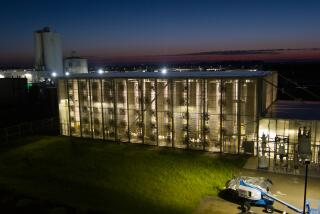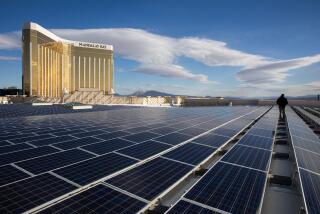Bravely Staring Into the Sun
- Share via
“Alternative sources of energy are not technologically feasible.” I was on my back patio listening to the voice on the TV. A man from one of the power companies was talking, telling viewers that the future seems bleak. While I looked in amazement at the temperature inside my backyard solar oven, I heard the man say that we only needed to all stick together and help support the power companies to help us get through this.
The man was suggesting that perhaps the power companies had been victimized. The inside of my solar oven was all steamed up, so I had to look hard to see that it was now about 300 degrees inside. I looked at my clock and figured that our lunch needed to cook only another 10 minutes.
I went back inside to a cool kitchen and listened to the sob story by the well-groomed man in a suit. His face was solemn as he said there could be rolling blackouts this summer due to the demand for power amid the diminished supply.
Diminished supply? The sun is, for all practical purposes, an unlimited supply of energy, if we can find ways to harness and use it in our homes and businesses. But the sun was one of the “alternative sources of energy” that the power company man on the TV said was not feasible.
Solar electricity is nothing new. Though we might see some technological breakthroughs, it is nevertheless feasible today. Solar radiation can be converted to electricity if you have the panels on your roof, the appropriate inverter, batteries and the will to do this in the first place. But the big power boys keep telling us that this is not an efficient or economical way to produce electricity.
I was bored of hearing this same propaganda that I’d heard 20 years earlier. I turned off the TV. I set our little solar radio in the sun and tuned in to hear someone talking about how Native Americans lived in the desert. I made a slight adjustment to the solar oven so that it directly faced the sun. The glass face was entirely steamed. The thermometer read about 325 degrees. I looked at my watch and decided it was time for our late lunch.
I guess we saved a little bit of natural gas by using the sun. If we had an electric stove, we’d have saved that much electricity. I heard the narrator on the radio speak of the unique architecture that was practiced in the arid Southwest U.S. for centuries--the thick adobe walls and, in some cases, canals that brought the water long distances. The narrator spoke of how the food supplies were dried in the arid heat and then stored for long periods. Meats, fruits, greens, beans, nuts, roots--all were dried so they could be reconstituted and eaten later.
Solar energy, I thought. I opened the front of my solar cooker and a whoosh of hot steam poured out. The lunch was piping hot, too hot to touch. I carefully served up two plates. We enjoyed our hot pizza and coffee while listening to a description of how bricks were once sun-dried and then made into homes and temples.
In our small backyard, our 2-foot-by-2-foot insulated solar oven cooked a meal in the midday sun. It was effortless to do this, keeping the kitchen cool and not using any of the energy supplies that we’re told are in such tight supply.
The “energy crisis” is a relative crisis. Like so many crises before, we should learn that it is as big of a problem as we choose to make it. It is, after all, a crisis that each of us has created by our choices.
One of those lazy choices was to believe the parade of high-paid men in suits who tell us that solar energy is not feasible and that we should just willingly pay them double or triple what we’ve been paying for the privilege of using their power.
There is a growing number of people who are not waiting around for the government and industry bailouts. They are educating themselves, changing their lifestyles and taking appropriate action. Companies installing solar electrical rooftop panels are busier now than before.
Our salvation lies not in the hands of government or in the hands of the utility companies. Our salvation lies in the hands of those brave enough to open their eyes.


